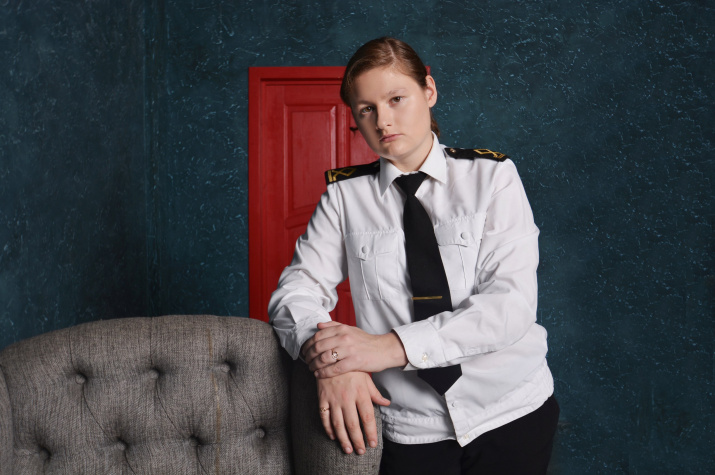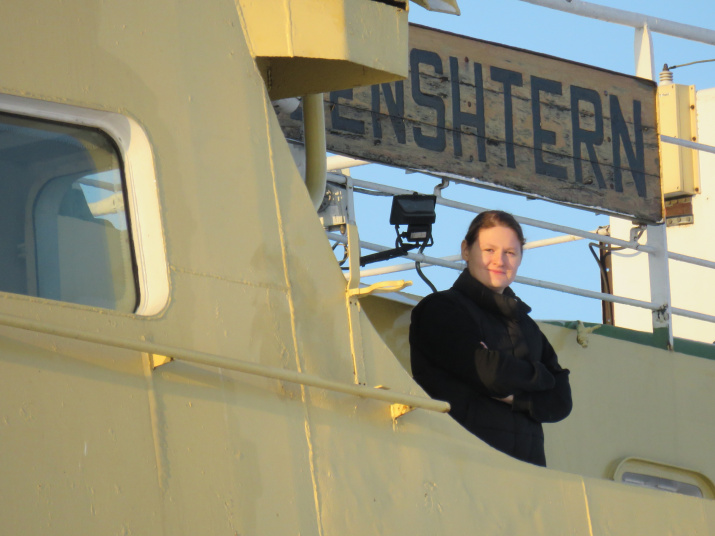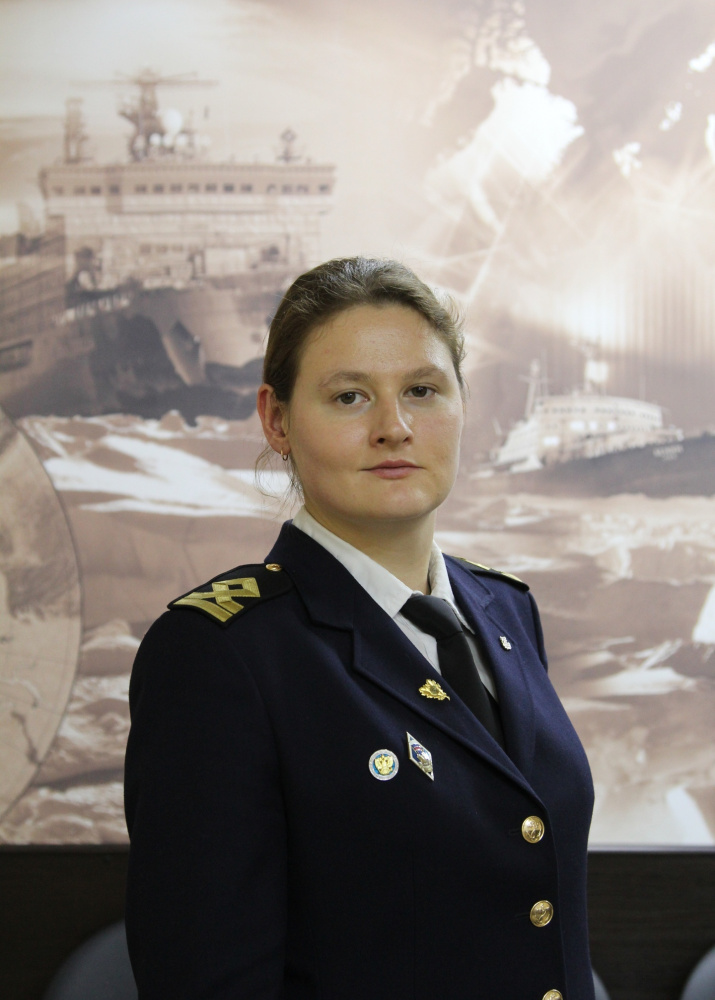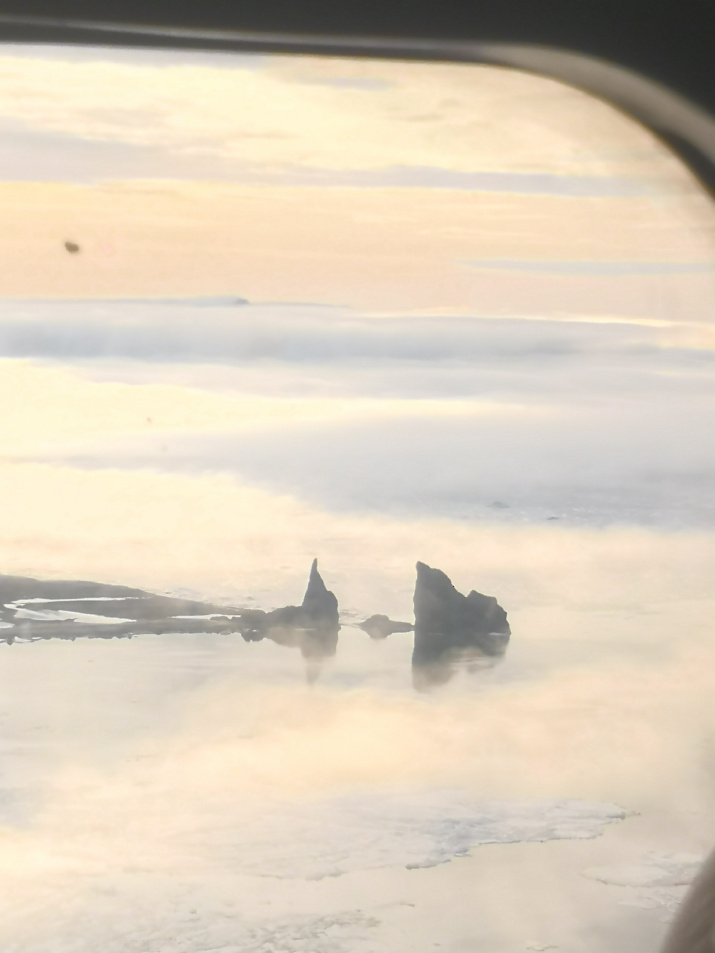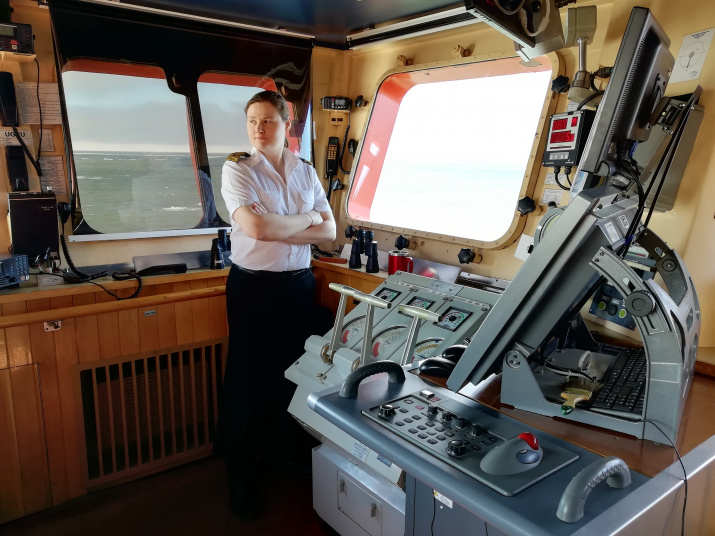The Arctic is a constant cold, lack of minimal comfort, long shifts. They say that women do not belong there, and they themselves are not very eager. But there are exceptions too. Among them - the second officer to the captain of the world’s most modern and powerful nuclear-powered icebreaker “50 Let Pobedy” (eng."50 years of Victory"), Diana Kidzhi. The first female navigator of the icebreaker fleet. She is 26 years old, and this very moment she is keeping the watch on the bridge on the next Arctic voyage.
- Diana, how did your journey to the Arctic begin?
- In 2016, I successfully graduated from Admiral Makarov State University of Maritime and Inland Shipping in St. Petersburg with a degree in Navigation. Immediately after graduating, I became the third officer on the “Ivan Kruzenshtern” icebreaker. This is one of six icebreakers that clean waterways between St. Petersburg and the Baltic Sea daily. And two years ago I joined the crew of the nuclear-powered icebreaker “50 Let Pobedy” (eng."50 years of Victory") as the second officer. Now, along with work, I'm attending a graduate school at my native university.
- Diana, was there negative attitude from the men at first? Were there jokes?
- My male colleagues do not insult me or make fun of me at all. I don’t even think about it now. While studying - during practice - it was harder. You still had to prove your right to be and work on board. Now the situation is different. There is respect from the colleagues. Respect that has nothing to do with who is in front of you: a man or a woman. This is a professional relationship, where they evaluate me as a specialist, how well I do my job.
- How did you even reach the rank of the second officer?
- "How did it happen?" is the wrong question. I moved firmly and continue to move towards my goal. I began practice in the ranks: cadet, sailor. Then - the fourth, third officer. Now I am the second. Normal consistent growth, like everyone else.
And by the way, I did not specifically intend to work in the Arctic region, it just so happened that after graduating from the academy I came to work on icebreakers. The first years I worked on a diesel-electric icebreaker in the Gulf of Finland. The ice work fascinated, captured me. After that, the transition to the nuclear-powered icebreaker in the Arctic was just a matter of time.
- And how much time have you spent at sea?
- If you count from the first practice, I’ve been going to sea since 2012. If you count according to the working documents, then before the graduation from the academy, I had had enough seafaring qualification for the certification of a mate on-watch (it required 12 months, but I had 18). Last fall, as a mate on-watch, I had enough qualification for the first officer (another 18 months). So you can do the math ...
- Diana, do you have people who you aspire to be like?
- I look up to senior colleagues. This is primarily the captain of the diesel-electric icebreaker "Ivan Kruzenshtern" Alexander Efimov, with whom I worked after graduating from the academy as a third officer, and who taught me the basics of icebreaking in the Gulf of Finland. And then, Dmitry Viktorovich Lobusov - the captain, if I may say so, of the old ice school, whose crew I am lucky to work with today on board the icebreaker “50 Let Pobedy” (eng."50 years of Victory"). These are the people who serve as an example for me - in their work skills, and in the love of the profession, and in the relationship with their crew.
- The nuclear-powered icebreaker “50 Let Pobedy” (eng."50 years of Victory") sails not only along the Northeast Passage, providing icebreaker assistance, but also delivers tourists to the North Pole. And what is more interesting for you?
- On board the icebreaker, I already have experience working on a cruise with tourists on the way to the North Pole when the icebreaker moves through the territory of the Russian Arctic National Park; and in the support of the academic expedition "Academician Fedorov"; and in winter navigation in the Gulf of Ob and the Kara Sea. On each voyage you can find something interesting and beautiful. And something complicated: with a scientific vessel, for example, you need to go strictly along the laid profile, moreover, at low speeds, bordering on those when the vessel is no longer being controlled.
On cruises, maneuvering in the straits of the Franz Josef Land archipelago, often clogged with iceberg debris, is quite difficult. But still, our main task is to provide icebreaker assistance to the ships. This is mainly work in the winter-spring period in the Gulf of Ob: ensuring the movement of the LNG carriers of the Yamal LNG project along the sea channel and the escort of cargo ships carrying goods for the construction of the Sabetta-2 terminal on the other side of the Gulf of Ob.
I love my job. The most interesting thing is maneuvering, controlling the screw propellers of the icebreaker, and finding the optimal path in the ice. But all this is the prerogative of the senior watch officer, chief officer. The mate on-watch is responsible for navigation: calculating the vessel route, track charting on the navigation map and keeping the ship's logbook. Mostly paper work.
- Are you tired of working at this pace?
- I’ll say that isolation from the family, from home without communication for 4-5 months is hard for everyone. Home is the favorite place on earth where you are always welcome. Nevertheless, I like traveling, visiting new places, countries.
- I was always interested in how not to fall asleep on watch. What do you do to stay awake: listening to louder music, drinking coffee?
- When keeping watch, it is required, as it is written in all existing rules and recommendations, “to conduct proper visual and auditory observation”, so that the music on the watch is not acceptable. Coffee - certainly - and not one cup (even a mug) per shift. Well, and also, while sailing, especially in a difficult area, the attention is strained so that you just can’t fall asleep. While drifting, of course, this is more difficult, but in general on the bridge you can always find yourself a job. The main thing is not to forget to conduct that very “proper observation”.
- As a representative of the Russian Arctic National Park, I would like to ask you: what place do you like most in it?
- Of course, I was impressed by Tikhaya Bay, that looked as if it descended from the pages of Stevenson’s novel: wooden houses, a wooden pier, things in houses left over from the middle of the last century. The romance of the boarding process itself. Not on ship’s boats – I can already see how some picky readers wrinkled their noses – specifically on motor boats. And I was also lucky to fly by Cape Tegetthoff in a helicopter: the charterer wanted to shoot beautiful shots for advertising booklets, and there was a place for a passenger on board. I think, the shooting was fully successful.
It was the most beautiful flight in my life.
- What do you do in your spare time? Read books, watch movies about the Arctic?
- Yes, communication on the Internet in the Arctic is difficult, so I read a lot. Now, for example, the biography of the polar captain Georgy Kononovich "My life". However, now I am undergoing the final stage of graduate school studies: final certification and the presentation of a scientific report on the work, so that less time is left for reading fiction than I would like.
If I ever watch films about the Arctic, they are documentaries. Feature films, such as “The Icebreaker”, do not impress me, because there are too many inconsistencies in the scenes that are standing out a mile.
- Do you have a life motto?
- My motto is: "Do what you must, and what happens, happens”.
Specially for our readers, Diana Kidzhi took a photo on a new voyage.
Diana Kidzhi: “An icebreaker is a person who looks back as much as they look ahead, because they are not just looking for the path, but are also responsible for those who follow. In the nautical sphere, it is usually not customary to look back.”
Marina Menshikova, press service of the Russian Arctic National Park

